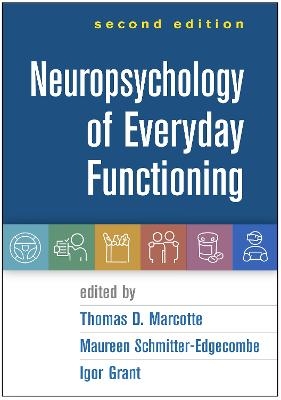
Neuropsychology of Everyday Functioning, Second Edition
Guilford Press (Verlag)
978-1-4625-4888-0 (ISBN)
New to This Edition
*Incorporates over a decade of technological and methodological innovations.
*Chapter on theories and models of everyday functioning.
*Chapters on naturalistic assessment, wearable sensors, ambulatory assessment, and virtual-reality-based tools.
*Practical clinical implications are highlighted throughout.
Thomas D. Marcotte, PhD, is Professor in the Department of Psychiatry at the University of California, San Diego (UCSD), Co-Director of the Center for Medicinal Cannabis Research, and Program Manager of the HIV Neurobehavioral Research Program at UCSD. Dr. Marcotte’s research focuses on the development of methods for assessing and predicting the impact of cognitive impairments, as a result of substance use or neurological conditions, on the ability to carry out a broad range of everyday activities, in particular, driving an automobile. He has published numerous articles and book chapters on these topics and has served on the editorial boards of the Journal of the International Neuropsychological Society and Neuropsychology. Maureen Schmitter-Edgecombe, PhD, is Regents Professor and H. L. Eastlick Distinguished Professor in the Department of Psychology at Washington State University. Dr. Schmitter-Edgecombe’s research focuses on investigating relationships between cognition and everyday functioning, and developing interventions and smart technologies to help delay functional disability and increase the quality of life of individuals with cognitive impairment. Her innovative interdisciplinary work with computer scientists and engineers has improved understanding of factors that can impact the ability to function independently and has led to the development of more ecologically valid assessment methods. She has published widely, serves on the editorial boards of leading neuropsychology journals, and has mentored many graduate students who are making significant contributions to the field. Igor Grant, MD, is Mary Gilman Marston Distinguished Professor of Psychiatry and Director of the HIV Neurobehavioral Research Program and the Center for Medicinal Cannabis Research at the University of California, San Diego. Dr. Grant has contributed extensively to the literature on neuropsychiatry, in particular, on the effects of alcohol abuse, drug abuse, HIV, and other disease states on neurocognitive functioning and underlying brain disease. His work has also touched on the effects of life stress on health. He is founding editor of the Journal of the International Neuropsychological Society and AIDS and Behavior. He is a recipient of the Distinguished Lifetime Contribution to Neuropsychology Award and the Nelson Butters Award for research contributions to clinical neuropsychology from the National Academy of Neuropsychology.
I. Assessment Concepts and Methods
A. Approaches to Assessing the Relationship between Cognition and Everyday Functioning
1. Neuropsychology and the Prediction of Everyday Functioning, Thomas D. Marcotte, Maureen Schmitter-Edgecombe, J. Cobb Scott, Rujvi Kamat, & Robert K. Heaton
2. Theories and Models of Everyday Functioning, Deirdre R. Dawson, Tania Giovannetti, & Barry Trentham
3. Human Factors/Ergonomics: Relevance to Assessments of Everyday Functioning, Laura H. Barg-Walkow, Cara B. Fausset, & Wendy A. Rogers
4. The Relationship between Cognition and Function: The Occupational Therapy Perspective, Carolyn M. Baum, Anna E. Boone, & Timothy J. Wolf
5. Cultural Considerations in the Assessment of Functional Abilities, Mariana Cherner & Lily Kamalyan
B. Assessment of Specific Functional Abilities and Assessment Considerations
6. The Relationship between Instrumental Activities of Daily Living and Neuropsychological Performance, Rosie E. Curiel Cid, Amarilis Acevedo, & David A. Loewenstein
7. The Prediction of Employment Functioning from Neuropsychological Performance, Joseph R. Sadek
8. Medication Management, Terry R. Barclay, Matthew J. Wright, Taylor P. Kuhn, & Charles H. Hinkin
9. The Brain on the Road, Jennifer Merickel & Matthew Rizzo
10. Naturalistic Assessment: Everyday Environments and Emerging Technologies, Maureen Schmitter-Edgecombe & Kayela Arrotta
11. Wearable Sensors, Ambulation, and Health, Catherine Sumida & Diane J. Cook
12. Ambulatory Assessment, Naomi S. Chaytor & Luciana Mascarenhas Fonseca
13. Virtual-Reality-Based Neuropsychological Assessments of Everyday Functioning, Thomas D. Parsons, Robert Kane, & Tyler C. Duffield
II. Everyday Impact of Normal Aging and Neuropsychiatric Disorders
14. Normal Aging and Everyday Functioning, Karlene Ball & Rachel Benz
15. Everyday Functioning in Alzheimer’s Disease and Mild Cognitive Impairment, Brian C. Castelluccio & Nicole C. R. McLaughlin
16. Everyday Functioning in Vascular Cognitive Impairment, Robert H. Paul, Lauren E. Salminen, & Joseph A. D. McBride
17. Everyday Impact of Traumatic Brain Injury, Catherine A. Mateer, Rema A. Lillie, Holly Tuokko, & Leslie H. Neipert
18. Cognitive Functioning and Everyday Tasks in Multiple Sclerosis, Peter A. Arnett & Megan M. Smith
19. Everyday Impact of HIV-Associated Neurocognitive Disorders, J. Cobb Scott, Haley Ceremony, & Thomas D. Marcotte
20. The Influence of Depression on Cognition and Daily Functioning, David J. Moore, Raeanne C. Moore, Laura M. Campbell, & J. Hampton Atkinson
21. Cognition and Daily Functioning in Schizophrenia, Amanda McCleery & Michael F. Green
22. Future Directions in the Assessment of Everyday Functioning, Maureen Schmitter-Edgecombe, Thomas D. Marcotte, & Igor Grant
Index
| Erscheinungsdatum | 13.04.2022 |
|---|---|
| Verlagsort | New York |
| Sprache | englisch |
| Maße | 178 x 254 mm |
| Gewicht | 1200 g |
| Themenwelt | Geisteswissenschaften ► Psychologie ► Allgemeine Psychologie |
| Geisteswissenschaften ► Psychologie ► Biopsychologie / Neurowissenschaften | |
| Geisteswissenschaften ► Psychologie ► Entwicklungspsychologie | |
| Medizin / Pharmazie ► Medizinische Fachgebiete ► Psychiatrie / Psychotherapie | |
| ISBN-10 | 1-4625-4888-1 / 1462548881 |
| ISBN-13 | 978-1-4625-4888-0 / 9781462548880 |
| Zustand | Neuware |
| Informationen gemäß Produktsicherheitsverordnung (GPSR) | |
| Haben Sie eine Frage zum Produkt? |
aus dem Bereich


